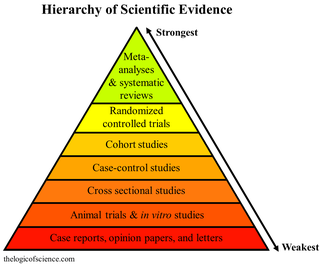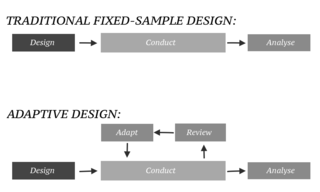
Gnumeric is a spreadsheet program that is part of the GNOME Free Software Desktop Project. Gnumeric version 1.0 was released on 31 December 2001. Gnumeric is distributed as free software under the GNU General Public License; it is intended to replace proprietary spreadsheet programs like Microsoft Excel. Gnumeric was created and developed by Miguel de Icaza, but he has since moved on to other projects. The maintainer as of 2002 was Jody Goldberg.

A meta-analysis is a statistical analysis that combines the results of multiple scientific studies. Meta-analyses can be performed when there are multiple scientific studies addressing the same question, with each individual study reporting measurements that are expected to have some degree of error. The aim then is to use approaches from statistics to derive a pooled estimate closest to the unknown common truth based on how this error is perceived. It is thus a basic methodology of metascience. Meta-analytic results are considered the most trustworthy source of evidence by the evidence-based medicine literature.
In statistics, Markov chain Monte Carlo (MCMC) methods comprise a class of algorithms for sampling from a probability distribution. By constructing a Markov chain that has the desired distribution as its equilibrium distribution, one can obtain a sample of the desired distribution by recording states from the chain. The more steps that are included, the more closely the distribution of the sample matches the actual desired distribution. Various algorithms exist for constructing chains, including the Metropolis–Hastings algorithm.
Bayesian statistics is a theory in the field of statistics based on the Bayesian interpretation of probability where probability expresses a degree of belief in an event. The degree of belief may be based on prior knowledge about the event, such as the results of previous experiments, or on personal beliefs about the event. This differs from a number of other interpretations of probability, such as the frequentist interpretation that views probability as the limit of the relative frequency of an event after many trials.

Sir David John Spiegelhalter is a British statistician and a Fellow of Churchill College, Cambridge. From 2007 to 2018 he was Winton Professor of the Public Understanding of Risk in the Statistical Laboratory at the University of Cambridge. Spiegelhalter is an ISI highly cited researcher.
OpenBUGS is a software application for the Bayesian analysis of complex statistical models using Markov chain Monte Carlo (MCMC) methods. OpenBUGS is the open source variant of WinBUGS. It runs under Microsoft Windows and Linux, as well as from inside the R statistical package. Versions from v3.0.7 onwards have been designed to be at least as efficient and reliable as WinBUGS over a range of test applications.
In statistics, (between-) study heterogeneity is a phenomenon that commonly occurs when attempting to undertake a meta-analysis. In a simplistic scenario, studies whose results are to be combined in the meta-analysis would all be undertaken in the same way and to the same experimental protocols. Differences between outcomes would only be due to measurement error. Study heterogeneity denotes the variability in outcomes that goes beyond what would be expected due to measurement error alone.
Bayesian inference of phylogeny combines the information in the prior and in the data likelihood to create the so-called posterior probability of trees, which is the probability that the tree is correct given the data, the prior and the likelihood model. Bayesian inference was introduced into molecular phylogenetics in the 1990s by three independent groups: Bruce Rannala and Ziheng Yang in Berkeley, Bob Mau in Madison, and Shuying Li in University of Iowa, the last two being PhD students at the time. The approach has become very popular since the release of the MrBayes software in 2001, and is now one of the most popular methods in molecular phylogenetics.
Approximate Bayesian computation (ABC) constitutes a class of computational methods rooted in Bayesian statistics that can be used to estimate the posterior distributions of model parameters.
Just another Gibbs sampler (JAGS) is a program for simulation from Bayesian hierarchical models using Markov chain Monte Carlo (MCMC), developed by Martyn Plummer. JAGS has been employed for statistical work in many fields, for example ecology, management, and genetics.
GeneNetwork is a combined database and open-source bioinformatics data analysis software resource for systems genetics. This resource is used to study gene regulatory networks that link DNA sequence differences to corresponding differences in gene and protein expression and to variation in traits such as health and disease risk. Data sets in GeneNetwork are typically made up of large collections of genotypes and phenotypes from groups of individuals, including humans, strains of mice and rats, and organisms as diverse as Drosophila melanogaster, Arabidopsis thaliana, and barley. The inclusion of genotypes makes it practical to carry out web-based gene mapping to discover those regions of genomes that contribute to differences among individuals in mRNA, protein, and metabolite levels, as well as differences in cell function, anatomy, physiology, and behavior.
Probabilistic programming (PP) is a programming paradigm in which probabilistic models are specified and inference for these models is performed automatically. It represents an attempt to unify probabilistic modeling and traditional general purpose programming in order to make the former easier and more widely applicable. It can be used to create systems that help make decisions in the face of uncertainty.
Free statistical software is a practical alternative to commercial packages. Many of the free to use programs aim to be similar in function to commercial packages, in that they are general statistical packages that perform a variety of statistical analyses. Many other free to use programs were designed specifically for particular functions, like factor analysis, power analysis in sample size calculations, classification and regression trees, or analysis of missing data.
Bayesian inference using Gibbs sampling (BUGS) is a statistical software for performing Bayesian inference using Markov chain Monte Carlo (MCMC) methods. It was developed by David Spiegelhalter at the Medical Research Council Biostatistics Unit in Cambridge in 1989 and released as free software in 1991.

JASP is a free and open-source program for statistical analysis supported by the University of Amsterdam. It is designed to be easy to use, and familiar to users of SPSS. It offers standard analysis procedures in both their classical and Bayesian form. JASP generally produces APA style results tables and plots to ease publication. It promotes open science via integration with the Open Science Framework and reproducibility by integrating the analysis settings into the results. The development of JASP is financially supported by several universities and research funds. As the JASP GUI is developed in C++ using Qt framework, some of the team left to make a notable fork which is Jamovi which has its GUI developed in JavaScript and HTML5.
PyMC is a Python package for Bayesian statistical modeling and probabilistic machine learning which focuses on advanced Markov chain Monte Carlo and variational fitting algorithms. It is a rewrite from scratch of the previous version of the PyMC software. Unlike PyMC2, which had used Fortran extensions for performing computations, PyMC relies on PyTensor, a Python library that allows defining, optimizing, and efficiently evaluating mathematical expressions involving multi-dimensional arrays. From version 3.8 PyMC relies on ArviZ to handle plotting, diagnostics, and statistical checks. PyMC and Stan are the two most popular probabilistic programming tools. PyMC is an open source project, developed by the community and fiscally sponsored by NumFOCUS.
Siddhartha Chib is an econometrician and statistician, the Harry C. Hartkopf Professor of Econometrics and Statistics at Washington University in St. Louis. His work is primarily in Bayesian statistics, econometrics, and Markov chain Monte Carlo methods.

Roderick Joseph Alexander Little is an academic statistician, whose main research contributions lie in the statistical analysis of data with missing values and the analysis of complex sample survey data. Little is Richard D. Remington Distinguished University Professor of Biostatistics in the Department of Biostatistics at the University of Michigan, where he also holds academic appointments in the Department of Statistics and the Institute for Social Research.

In an adaptive design of a clinical trial, the parameters and conduct of the trial for a candidate drug or vaccine may be changed based on an interim analysis. Adaptive design typically involves advanced statistics to interpret a clinical trial endpoint. This is in contrast to traditional single-arm clinical trials or randomized clinical trials (RCTs) that are static in their protocol and do not modify any parameters until the trial is completed. The adaptation process takes place at certain points in the trial, prescribed in the trial protocol. Importantly, this trial protocol is set before the trial begins with the adaptation schedule and processes specified. Adaptions may include modifications to: dosage, sample size, drug undergoing trial, patient selection criteria and/or "cocktail" mix. The PANDA provides not only a summary of different adaptive designs, but also comprehensive information on adaptive design planning, conduct, analysis and reporting.






